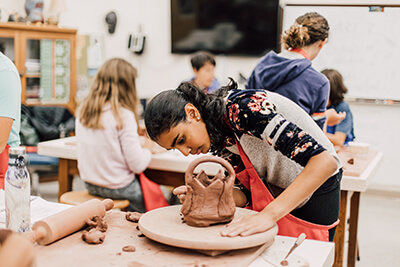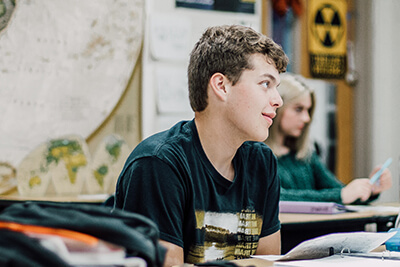January 2, 2020
 Empowering Students To Understand Stress And Navigate Anxiety
Empowering Students To Understand Stress And Navigate Anxiety
Feeling frightened has infiltrated everyday life. As a society, we worry about the future, and are unsettled about the unknowns. We’re stressed and we’re scared, with anxiety showing up among people of all ages.
While anxiety is increasingly common, learning how to manage—and even embrace—difficult emotions helps build resilience while cultivating individual and interpersonal skills. At Mounds Park Academy, Dr. Jules Nolan works with faculty, students, and parents to help families understand what stress means in context of overall well-being. As a licensed, nationally certified school psychologist and president of Minnesota’s association of school psychologists, Dr. Nolan brings expertise in child and adolescent mental health, behavioral issues, school performance, learning issues, and effective teaching and parenting strategies.
“We are seeing a spike in student anxiety (nationwide), driven by three key factors,” she explains. “One factor is that we have more sophisticated tools to diagnose anxiety. So, while the prevalence can seem greater, it’s tied to a better understanding of what anxiety is and what makes it different from other conditions. At the same time, we are seeing circumstances where anxiety is over-diagnosed. For example, in any given population we would expect one to three percent of people to meet criteria for generalized anxiety. However, in some schools we’re seeing as many as 20 to 25 percent of students with that diagnosis. The third, and perhaps most influential factor, is that our society often has a hard time grappling with stress and anxiety, and by trying to push it away, we are actually making it more difficult for children to develop coping skills.”
Stress As A Signal To Learn And Grow
Dr. Nolan explains that anxiety is a normal and useful physiological response that helps our brains identify risk and then make decisions quickly and appropriately—the “fight or flight” instinct. “When our ancestors saw the sabretooth tiger, they could survive by either fighting it or by running away. By trusting their gut when they felt anxiety about the threat this animal posed, they could respond in a way that protected their safety. But the people who waited and watched, and didn’t take any action? They got eaten.”
While we’re not likely to have to outrun a tiger, our modern brains send anxiety signals to help us determine the productive next step. “Anxiety can serve as a positive alert that’s time to analyze what’s happening, calm down, and take action—whether that’s working your way through a final exam, giving a presentation, or walking into a room of strangers,” says Dr. Nolan. “It’s a mechanism that helps us cope with unexpected or dynamic situations, and then rally to respond. It’s important that we empower students to use that emotional response as a way to navigate tough situations.”
 Parents are sometimes tempted to remove barriers and smooth out situations on behalf of their children, but creating an artificially easy road actually prevents students from learning essential coping skills. “When we try to protect students from all negative emotions, we inadvertently take away their ability to advocate for themselves, to solve challenging problems, to rebound when something disappointing happens,” Dr. Nolan says.
Parents are sometimes tempted to remove barriers and smooth out situations on behalf of their children, but creating an artificially easy road actually prevents students from learning essential coping skills. “When we try to protect students from all negative emotions, we inadvertently take away their ability to advocate for themselves, to solve challenging problems, to rebound when something disappointing happens,” Dr. Nolan says.
“To be emotionally healthy, we need to be okay with sometimes being uncomfortable, lonely, or sad. We need to know that we can manage through these episodes with coping strategies. And, it’s important to learn those skills when the stakes are low—for example, not being invited to a grade school birthday party—as opposed to encountering a high stakes disappointment later in life and not knowing how to handle it.”
Dr. Nolan recommends that as children become adolescents, parents view themselves as “curious advisors” who ask their children questions and share perspectives, without implying that there’s only one right way to be, or to get something done. She also suggests that, starting in early adolescence, parents teach their kids to build their competencies and life skills by doing things like scheduling their own dentist appointments, or reaching out to a team coach to discuss a schedule conflict.
“Honoring their autonomy and celebrating their hard-earned accomplishments is a fabulous way to reinforce that you trust and support your children, while still being present and active in their lives,” she says. “Confidence and competence become the theme, with stress just an ordinary aspect of how we understand ourselves, and grow from each experience.”
Learn more about it: Healthy Approaches to Anxiety
- This Newsweek feature on scientists’ understanding of anxiety takes a close look at how the brain functions and how mindfulness can help reduce fears about the future.
- The hidden benefits of stress can actually make use healthier, gaining strength, energy, and happiness.
- Six tactics to help students